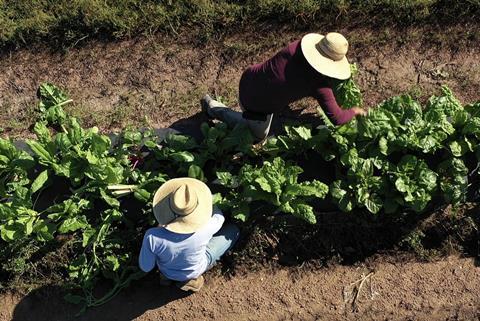Project led by MSU assistant professor Zach Rutledge has been awarded funding by USDA NIFA through to 2028

A Michigan State University (MSU) agricultural economist has been awarded a US$650,000 grant from the US Department of Agriculture’s National Institute of Food and Agriculture (USDA NIFA), to evaluate labour challenges affecting the country’s food supply chain and identify potential policy options to alleviate them.
Zach Rutledge, an assistant professor in the MSU Department of Agricultural, Food and Resource Economics, has studied issues relating to labour scarcity in the agricultural sector over the past several years.
He said that as the US-based agricultural workforce — immigrant and nonimmigrant workers settled within the country — continued aging and declining in number, farmers have had to make changes in their production practices.
This has included implementing new technology on farms and contracting workers through third parties.
The key objectives from the project focus on how trends in the US-based workforce have influenced visa programmes such as the H-2A programme, and vice versa.
H-2A allows US employers to temporarily hire nonimmigrants from different countries for agricultural services throughout the year.
Rutledge will examine how the decline in US-based workers has impacted the number of workers farms hire through the H-2A programme, and if the programme can serve as a viable substitute for labour shortages in the workforce.
He will similarly investigate how the H-2A programme’s Adverse Effect Wage Rate (AEWR), the minimum wage paid to H-2A workers, impacts the wage rates of domestic farmworkers not in the programme.
In 2024, Michigan’s AEWR was US$18.50 per hour, an increase from Us$17.34 per hour in 2023 and US$15.37 per hour in 2022.
The goal of the project, he noted, was to provide impartial data highlighting how potential policy decisions shape both sides of the labour market.
“Our overall aim for the grant is to provide context on both sides of the labour market,” Rutledge said.
“Employees have their own challenges. They’re often paid low wages and subject to economic disparities. Farmers want to remain profitable and keep wages low enough for it to make sense to stay in business.
“We’re neutral,” he continued. ”We’re not saying certain policies would be good or bad. We’re just providing evidence that generates an estimate of what the policy effects would be.”
Additional objectives include understanding if the declining number of US-based agricultural workers shifts the country’s dependance on fruit and vegetable imports, while simultaneously considering how such trends might translate into national or economic security risks.
Continuing an analysis previously conducted, Rutledge will look at how healthcare coverage plays a part in the development of agricultural workforces and prosperity of businesses.
He said initial findings from the assessment showed there was a mutual benefit for employers and employees if healthcare coverage was offered.
“Having access to services such as healthcare is important for agricultural workers,” Rutledge said. “We found that it’s profit-enhancing for employers to offer healthcare.
”When healthcare is offered to employees, they tend to become more productive, and that’s obviously good for farms and makes them profitable.”
Also supported by the grant is Tim Richards, the Morrison Chair of Agribusiness at Arizona State University, who will coordinate a study regarding the role imperfect competition in labour markets has on employee welfare and labour supply in the retail grocery industry.
The entire project is funded through to 2028.
Rutledge said results would be shared in academic journals and through lay summaries published by MSU Extension and industry groups.






